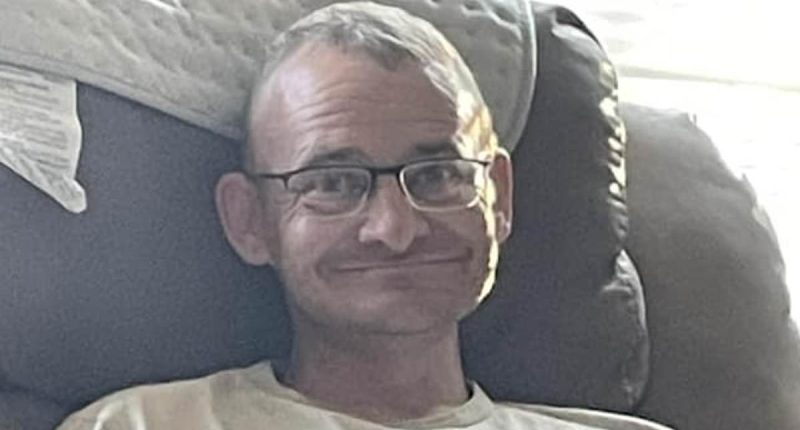Share this @internewscast.com
As Anthony Thomas ‘TJ’ Hoover II was wheeled into surgery to harvest his organs, his eyes flitted back and forth and began to open.
Even after doctors declared the 36-year-old deceased, Hoover’s brain activity continued to increase. As he was transported to the operating room in Kentucky, records indicate that he began moving and crying on the bed, proving he was very much alive.
Doctors halted the surgery only after arguing with the team responsible for procuring Hoover’s organs, who wanted to continue anyway.
Hoover’s situation sparked a federal investigation lasting several years into Kentucky’s organ donation nonprofit. The team reportedly had to quickly find another surgeon to proceed with the organ harvest when the initial doctor refused to operate on a living person.
The investigation by the federal Health Resources and Services Administration (HRSA) looked into around 350 cases connected to Kentucky Organ Donor Affiliates (KODA). In these cases, the plans for organ retrieval were ultimately canceled because the patients who had been declared dead began showing signs of life.
In 73 cases, federal investigators found organ harvesting should have been stopped sooner as patients showed improving consciousness and signs of pain or distress, according to the New York Times.
While most patients are deemed eligible to donate organs after being declared brain dead, these patients had experienced circulatory death – when the heart stops functioning and blood and oxygen no longer circulate in the body.
Opponents of donation after circulatory death (DCD) argue the practice has looser criteria for declaring someone dead, leading to the potential for someone who is not definitively dead being taken off of life-sustaining measures for premature donation.

The federal inquiry into Kentucky’s organ procurement practices began last fall when the House Energy and Commerce Committee learned of TJ Hoover’s experience
DCD has been steadily becoming more common over the years, and involves recovering organs after the heart stops, though some brain activity may remain.
Traditionally, most organ donations come from patients declared brain dead, the complete and irreversible loss of all brain function – though patients may be hooked up to machines that keep the heart and lungs working.
Because heart and lung function is maintained with machines, organs remain viable for transplant.
With circulatory death, death is declared when circulation and respiratory function has stopped – even though they haven’t been declared brain dead.
When hospitals identify patients nearing death who might be eligible donors, they notify organ procurement organizations (OPOs) such as KODA.
An OPO representative then visits the hospital to assess whether the patient shows signs of imminent brain death.
If brain death is unlikely but the patient cannot survive without life support and the family is considering withdrawing care, the case may be appropriate for DCD.
In these situations, the OPO works closely with the family and medical team to coordinate end-of-life plans and organ donation.
DCD helps increase the number of available donors, offering hope to more than 103,000 Americans waiting for life-saving heart, kidney, lung, and other organ transplants.
But the practice has proven to be an ethical minefield. While organ procurement organizations like KODA insist they do not harvest organs from live patients, federal officials and activists say Hoover’s case was not a one-off.
DCDs have become increasingly common as a way to meet the needs of a growing number of people on national waiting lists.
![TJ Hoover [left] was declared dead after a drug overdose in 2021 and was about to be removed from life support. His sister Donna [right], had seen signs that her brother was still conscious, though, including moving his eyes to find her in the room](https://i.dailymail.co.uk/1s/2025/06/09/16/99181489-14794563-TJ_Hoover_left_was_declared_dead_after_a_drug_overdose_in_2021_a-a-3_1749484439465.jpg)
TJ Hoover [left] was declared dead after a drug overdose in 2021 and was about to be removed from life support. His sister Donna [right], had seen signs that her brother was still conscious, though, including moving his eyes to find her in the room
The number of organs recovered from DCD Donors in 1993 was 112. By 2021, over 10,000 recovered organs came from DCD donors.
The federal inquiry into Kentucky’s organ procurement practices began last fall when the House Energy and Commerce Committee learned of Hoover’s experience.
Hoover was rushed to the hospital after a drug overdose in October 2024. He was unresponsive in the hospital.
For two days after Hoover’s family agreed to donate his organs, KODA officers tested the man’s organs and lined up transplant surgeons and recipients.
During one exam on his heart, Hoover was ‘thrashing on the bed,’ according to patient records, and was sedated to prevent further motion.
His sister, Donna Rhorer, remembered watching him being wheeled to the operating room as his eyes moved and tracked where his sister was, keeping his gaze in her direction. She and the rest of the family were told this was a common reflex.
‘It was like it was his way of letting us know, you know, “Hey, I’m still here,”’ Rhorer told NPR.
The hospital staff ‘was extremely uncomfortable with the amount of reflexes patient is exhibiting,’ case notes read. ‘Hospital staff kept stating that this was euthanasia.’
A procurement organization coordinator assured them it was not.

Hoover’s sister has been caring for him since he was released from the hospital in 2021. He has trouble walking, remembering, and talking
A former KODA employee told the New York Times that had it not been for that doctor who called off the procedure, ‘we absolutely 1,000 percent would have moved forward.’
Natasha Miller, who used to work for KODA as an organ preservationist, told NPR last year that, at the time, the organ procurement case coordinator was scrambling with her boss about what to do next as Hoover thrashed and cried.
Miller said: ‘So the coordinator calls the supervisor at the time. And she was saying that he was telling her that she needed to “find another doctor to do it” – that, “We were going to do this case. She needs to find someone else.”
‘And she’s like, “There is no one else.” She’s crying — the coordinator — because she’s getting yelled at.’
Three other former KODA employees have attested to seeing similar cases.
Patients are typically taken to the operating room, where doctors remove them from life support and wait for the natural dying process to wrap up. The organs are only transplantable if the patient dies within an hour or two.
Strict rules are in place barring any procedure from beginning before a patient dies.
But the HRSA investigation, as reported by the Times, shows that KODA employees repeatedly pressured families to green-light organ harvesting, improperly took over cases from doctors, and tried to push hospital staff to pull patients from life support even amid indications that patients were becoming more aware of their surroundings.
KODA employees also failed to recognize that hospital-administered sedatives or illegal drugs could mask a patient’s actual neurological condition, making them appear in worse shape than they are.

KODA, now Network for Hope after a merger, said it ‘is disappointed in the New York Times story that declines to include factual clarifications and critical context about organ and tissue donation’
In another case, in December 2022, a 50-year-old man who had suffered an overdose began stirring in his bed less than an hour after being removed from life support. He woke up and started looking around.
The retrieval attempt was not immediately scrapped nor was the patient given any explanation as to what was going on, ‘but was becoming more aware by the minute,’ a doctor’s notes said.
The attempt wasn’t called off for another 40 minutes, the point at which his organs were no longer viable. In the ICU, he was awake and speaking with his family, though the patient died three days later.
KODA, now Network for Hope after a merger, said it ‘is disappointed in the New York Times story that declines to include factual clarifications and critical context about organ and tissue donation.
‘Network for Hope remains committed to transparency and to the mission of saving lives. That commitment has not changed. The only people hurt by inaccuracies in journalism are those who are awaiting a second chance for life.
‘Network for Hope is in full compliance with all requirements of the Centers for Medicare & Medicaid Services (CMS). We are fully committed to transparency and accountability to their regulations regarding Donation after Circulatory Death (DCD) donation.’

















